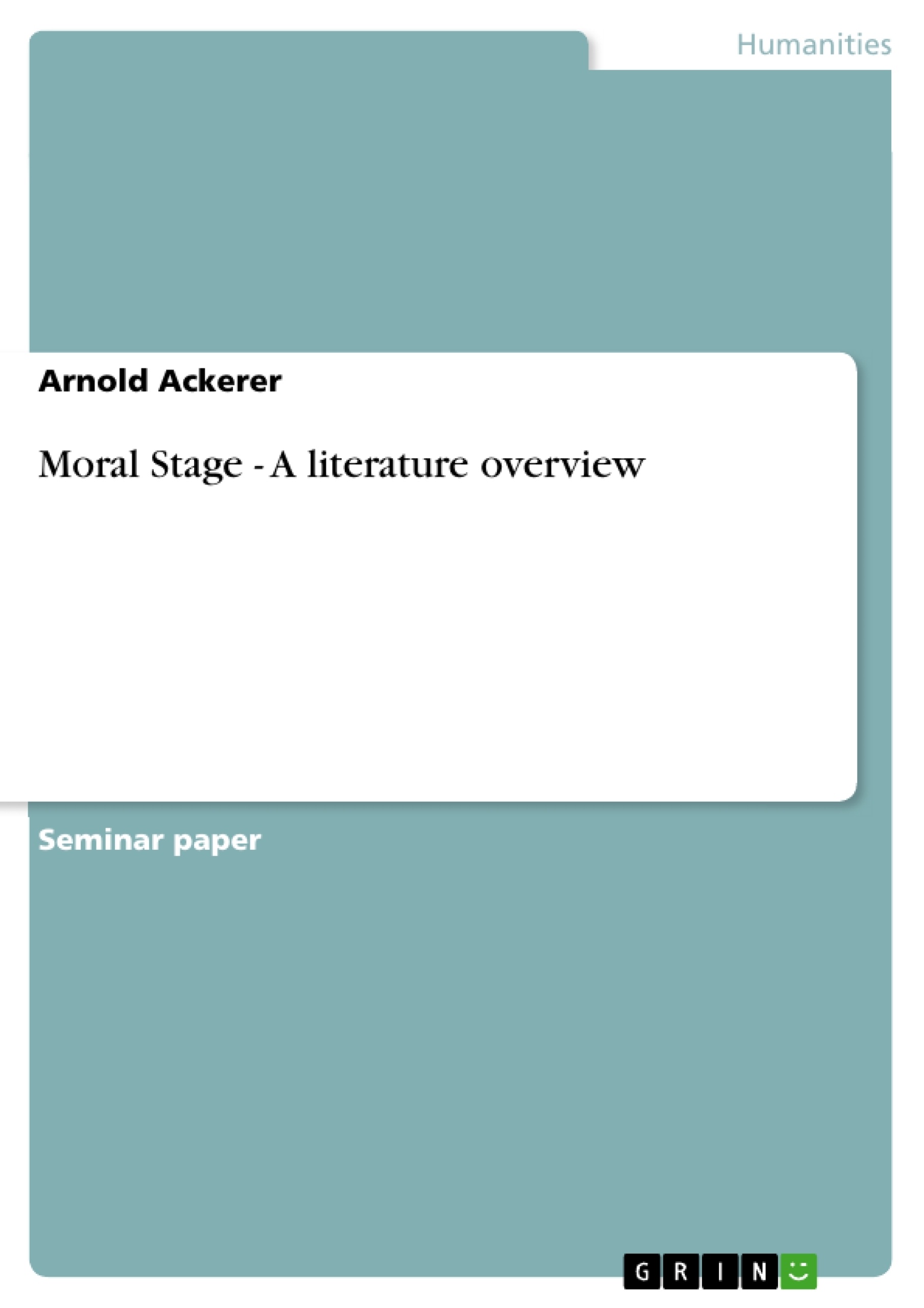This paper is a comprehensive review of psychological literature concerning the issue of
morality in psychological research. Though the emphasis is on psychological constructs
the first chapter offers philosophical and sociological views on morality. In the second
chapter Kohlberg’s stage sequence theory is explained from its origins in Piaget’s work
to various criticisms of the theory. The second chapter also provides extensive
information about measurement and the different approaches popular in psychological
literature. The last part in the second chapter links other constructs like socioeconomic
status, grade point average, collectivism, and psychoticism to moral reasoning. The third
chapter concludes the paper with a review of the most important thoughts on morality and
states the need for further research in special areas.
Table of Contents
- [I] Introduction
- [II] Background Ideas and Issues
- [A] Philosophy
- (i) Kant, metaphysics of morals, and critique of practical reason
- (ii) Good will
- (iii) Doubt of empirical usefulness
- (iv) Categorical imperative
- (v) Hegel's challenge
- (vi) A theory of justice
- (vii) Recent developments
- [B] Sociological Perspective
- [A] Philosophy
- [III] Psychological Approaches - Theory
- [A] Developmental Stages
- [B] Piaget and Moral Development of Children
- [C] Kohlberg's Theory of Moral Development
- [D] Kohlberg's Critics
- (i) Gender differences
- (ii) Piagetian criticism
- (iii) Value differentiation as stage transition
- (iv) Objective measurement
- [E] Response to Critics
- [F] State of the Field
- [IV] Psychological Approaches - Measurement
- [A] Kohlberg's Scoring System
- (i) History of stage scoring
- (ii) Structural issue scoring
- (iii) Standard issue scoring
- [B] Defining Issue Test (DIT)
- (i) Reliability
- (ii) Validity
- (iii) Faking DIT scores
- (iv) Relation to verbal ability
- [C] Morally Debatable Behaviors Scale
- [D] Moral Orientation Scale using Childhood Dilemmas (MOS)
- (i) Reliability
- (ii) Validity
- [E] Moral Dilemma Questionnaire (MDQ)
- (i) Reliability
- (ii) Validity
- [A] Kohlberg's Scoring System
- [V] Moral Judgment and Beyond – Correlations with other Constructs
- [A] Sociological Variables and Psychological Traits
- (i) Socioeconomic status (SES)
- (ii) Personality traits
- (iii) Social perspective taking
- (iv) Collectivism
- (v) Grade point average
- [B] Religious Aspects in Moral Reasoning
- [C] Cultural Differences
- [D] Applications of Moral Judgement Research
- [A] Sociological Variables and Psychological Traits
Objectives and Key Themes
This paper provides a comprehensive review of psychological literature concerning the issue of morality in psychological research. It explores the origins of morality, tracing its evolution from philosophical and sociological viewpoints to its psychological applications. The paper delves into the development and measurement of moral judgment, critically examining various theoretical approaches, notably Kohlberg's stages of moral development, and its critiques.
- Philosophical and sociological underpinnings of moral judgment
- Theoretical approaches to moral development, particularly Kohlberg's stage theory
- Assessment and measurement of moral reasoning in psychological research
- Correlation of moral judgment with other psychological and sociological factors
- Applications of moral judgment research in various contexts
Chapter Summaries
The first chapter delves into the historical and theoretical roots of morality, examining philosophical perspectives from Kant and Rawls to sociological insights. The second chapter focuses on psychological approaches to moral development, presenting Kohlberg's stage theory and its theoretical origins. The chapter also critically analyzes various critiques of Kohlberg's model. The third chapter explores different measurement instruments for assessing moral judgment, including Kohlberg's scoring system and other popular scales. The final part of the chapter delves into the correlation between moral reasoning and other constructs, such as socioeconomic status, personality traits, and collectivism.
Keywords
This paper focuses on the concept of moral judgment, exploring its theoretical foundations and practical applications in psychological research. Key keywords include moral development, Kohlberg's stage theory, moral reasoning, measurement instruments, socioeconomic status, personality traits, and cultural differences.
Frequently Asked Questions
What is Kohlberg’s theory of moral development?
Kohlberg’s theory proposes that moral reasoning develops through six progressive stages, moving from self-interest to social conformity and ultimately to universal ethical principles.
How did Piaget influence moral research?
Piaget provided the foundation by studying children’s play and rules, identifying two main stages: heteronomous morality (rules from authority) and autonomous morality (rules by cooperation).
What is the Defining Issue Test (DIT)?
The DIT is a standardized questionnaire developed by James Rest to measure moral judgment by having participants rate and rank moral dilemmas.
What are the main criticisms of Kohlberg's model?
Critics like Carol Gilligan argue that the theory is gender-biased, focusing on a "justice" orientation while neglecting a "care" orientation more common in women.
Does socioeconomic status affect moral reasoning?
Research shows correlations between higher socioeconomic status, education levels, and more advanced stages of moral judgment.
- Quote paper
- Arnold Ackerer (Author), 1998, Moral Stage - A literature overview, Munich, GRIN Verlag, https://www.hausarbeiten.de/document/21991


